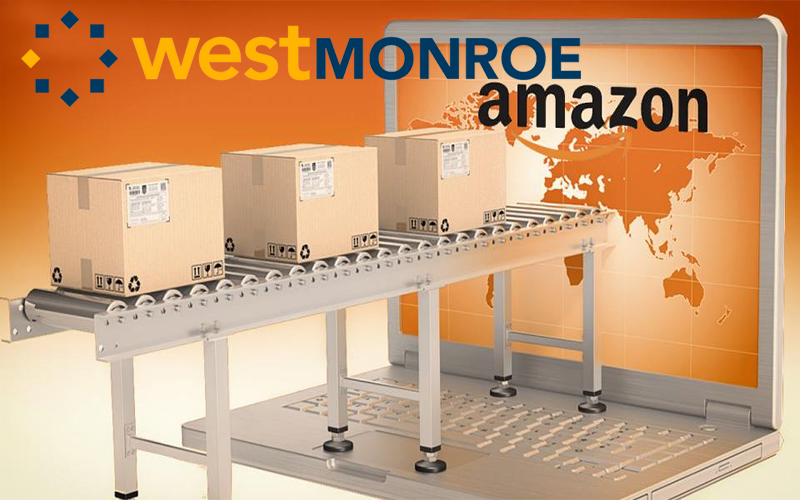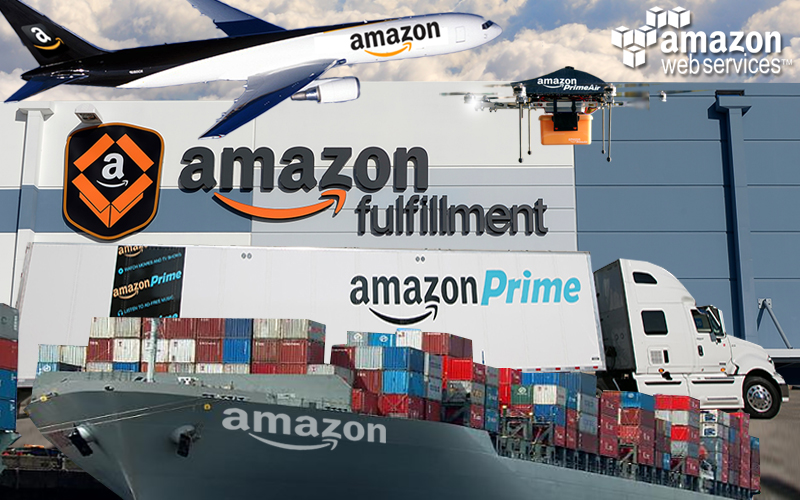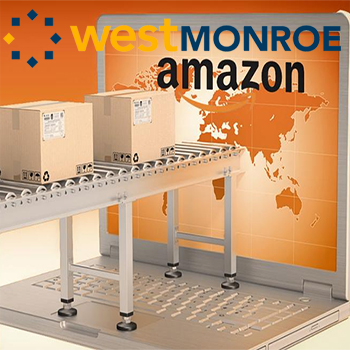With Much Unknown, Stakeholders Pay Close Attention to Amazon’s Supply Chain Plans

Logistics Management Group News Editor Jeff Berman recently caught up with Tom Racciatti, a director in West Monroe’s Operations Excellence practice, to get some fresh perspective on Amazon’s supply chain.
Given the size, scale, and breadth of global e-commerce bellwether Amazon, it is not surprising that ostensibly every single thing the company does comes under the microscope for a closer look.
That is especially true when it comes to Amazon’s logistics, transportation, distribution, and warehousing operations, or, in other words, all things Amazon supply chain-related.
There are several things in various industry circles and the media, no doubt, that indicate Amazon is indeed quite active on the supply chain front and could very well be looking to increase its presence as it relates to moving, shipping, and distributing the goods it sells through its ubiquitous Web site.
Some of these things include: its 2012 $775 million acquisition of Kiva Systems, a developer of mobile-robotic solutions that automate eCommerce order fulfillment and warehouse operations; and a recent announcement that it plans to lease 20 Boeing 767 freighter aircraft from ATSG’s Cargo Aircraft Management.
What’s more, a February report from Transport Intelligence stated that 3PLs have profited from aligning themselves with the e-commerce giant’s rapid growth.
Download the Report: Global E-Commerce Logistics 2016
However, as both Amazon and customers evolve, LSPs risk being left on the shelf. One of the key findings of the report is that as consumers continue to place their items in Amazon’s basket in ever-increasing numbers, they cannot afford to cut ties with the e-commerce giant without losing significant volumes.
For these reasons, and many others, Amazon continues to receive heightened interest in regards to how it handles supply chain and logistics operations. Logistics Management Group News Editor Jeff Berman recently caught up with Tom Racciatti, a director in West Monroe’s Operations Excellence practice, to get some fresh perspective on Amazon’s supply chain.
Why would bringing shipping and logistics “in house” be considered advantageous for Amazon? Most industry observers they are better off partnering with FedEx and the USPS as they currently already are?
For the same reason any business looks to vertically integrate their value chain, Amazon could stand to benefit by cutting out the middle man - in this case for their logistics and distribution function. You rarely see companies bringing asset-intensive logistics business in house, but that is only due to the scale and capital needed to make it happen. A business of Amazon’s size can realistically consider these kinds of moves because they have the requisite capital and network.
The recent news about Amazon leasing 20 Boeing 767 freighter aircraft from ATSG was viewed as a way to help smooth out high inventory levels by many. Do you view this move as the first of many in which Amazon attempts to gain more control of transportation assets?
Absolutely. Amazon is looking to improve service, cut costs, and in essence cut the cord that their transportation providers hold.
Should Amazon continue to take steps to gain more control of its transportation and logistics operations? Will it be able to truly reduce in house logistics and shipping/logistics costs, given that its margins are still pretty low, coupled with its massive scale and shipping volumes?
Massive scale and shipping volumes work in Amazon’s favor in terms of reducing costs by bringing logistics in house. Needless to say, along with their scale and volumes they deal with vast complexity (especially when dealing with regulation, maintenance, hub management, multiple 3rd parties, etc. involved with cargo air freight) – which makes this undertaking an incredibly ambitious one.
As with any other “non-core” business acquired, there will be a significant learning curve for Amazon as it struggles to manage their freight anywhere close to as efficiently as a FedEx or USPS – which perform this work as a core competency. As such, it’s important to conduct detailed business casing, or to engage a consulting firm like ours, with a conservative learning curve ramp up to realistically understand the up-front losses expected before the long-term gains are realized.
Generally speaking, how will Amazon’s logistics’ presence impact the industry, logistics and supply chain industries, specifically?
Amazon’s logistics presence could have a significant impact on the logistics industry (carriers, brokers, and shippers alike); however, it seems very unrealistic that this transition could happen in any short-term scenario.
If Amazon truly believes this is an effective cost-savings and service win strategy when considering all of the involved factors, the transition would likely be glacial and would still include common carriers as partners for the foreseeable future. If we are to consider a reality where Amazon manages its own proprietary fleet, the peripheral industry impacts would be straight forward in my eyes (i.e., lost volume and revenues for carriers and brokers, which could cascade to more expensive rates for other shippers as their carrier base loses important volume to support their fixed cost base).
Image: Bidness Etc
Related: Amazon Logistics Services - The Future of Logistics?

Article Topics
Transport Intelligence News & Resources
Freight Forwarders: Technology as the key differentiator E-commerce and Freight: Balancing new patterns of demand 2023 Parcel Express Roundtable: Shifting dynamics in a vibrant market Outsourcing will remain a key part of supply chain and logistics: Part II State of Global Logistics: Delivering above and beyond New Transport Intelligence report finds that Asia’s outsourcing needs accelerated contract logistics Armstrong & Associates 2017 Top 50 U.S. and Global Third-Party Logistics Providers More Transport IntelligenceLatest in Supply Chain
Apple Accused of Multiple Human Rights Violations UPS Struggles in First Quarter With Steep Earnings Decline How Supply Chains Are Solving Severe Workplace Shortages SAP Unveils New AI-Driven Supply Chain Innovations How Much Extra Will Consumers Pay for Sustainable Packaging? FedEx Announces Plans to Shut Down Four Facilities U.S. Manufacturing is Growing but Employment Not Keeping Pace More Supply Chain














